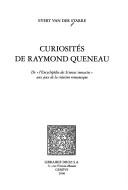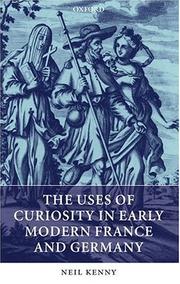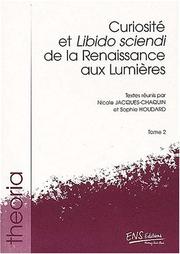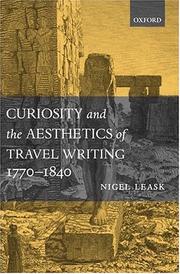| Listing 1 - 10 of 12 | << page >> |
Sort by
|
Book
Year: 2006 Volume: 425 Publisher: Genève : Droz,
Abstract | Keywords | Export | Availability | Bookmark
 Loading...
Loading...Choose an application
- Reference Manager
- EndNote
- RefWorks (Direct export to RefWorks)
Book
ISBN: 9782745327413 Year: 2015 Volume: 88 Publisher: Paris Honoré Champion
Abstract | Keywords | Export | Availability | Bookmark
 Loading...
Loading...Choose an application
- Reference Manager
- EndNote
- RefWorks (Direct export to RefWorks)
Pour limiter le caractère addictif de la curiosité, distinguer envie de connaître et vanité de savoir, l'auteur analyse les préceptes émis par Montaigne dans Les essais. ©Electre 2016
Book
ISBN: 9789042027268 9042027266 Year: 2009 Volume: 340 Publisher: Amsterdam Rodopi
Abstract | Keywords | Export | Availability | Bookmark
 Loading...
Loading...Choose an application
- Reference Manager
- EndNote
- RefWorks (Direct export to RefWorks)

ISBN: 2600010661 9782600010665 Year: 2006 Volume: 425 Publisher: Genève : Droz,
Abstract | Keywords | Export | Availability | Bookmark
 Loading...
Loading...Choose an application
- Reference Manager
- EndNote
- RefWorks (Direct export to RefWorks)
Book
ISBN: 9042027274 9789042027275 9042027266 9789042027268 Year: 2009 Publisher: Amsterdam New York, NY
Abstract | Keywords | Export | Availability | Bookmark
 Loading...
Loading...Choose an application
- Reference Manager
- EndNote
- RefWorks (Direct export to RefWorks)
This comprehensive exploration of curiosity in the fiction and life-writing of André Gide (1869–1951) is an important modernist contribution to the field of curiosity in literature and cultural studies more broadly. Curiosity was a credo for Gide. By observing the world and then manifesting in writing these observations, he stimulates the curiosity of readers, conceived as virtual conduits of a curiosity once his own. Using a thematic structure of sexual, scientific and writerly curiosity, this volume identifies processes of curiosity in the life-writing (including the travel-writing) which illuminate processes in the fiction, and vice versa. Theories of fetishism, gender and sexuality are applied to Gide’s corpus to illustrate his championing of a masculine curiosity of enlightenment and adventure over a feminised ‘curiosité-défaillance’ of disobedience and harm, and to explore objects eliciting his incuriosity. Gide’s creativity is nourished by his curiosity, as close readings of his work informed by Melanie Klein’s psychoanalytic writing on epistemophilia reveal. Curiosity is a rewarding, non-reductionist perspective from which the exceptional variety of Gide’s subject matter, style and genre can be more coherently understood. Research draws principally on the six Pléiade volumes of Gide’s œuvre , published 1996–2009.
Curiosity in literature. --- Gide, André, --- Gide, André --- Gide, André Paul Guillaume --- Žid, Andre, --- Zhiīd, Andrah --- Jīd, Āndrah --- Chi-te --- Gide, André Paul Guillaume --- Jiddo, Andore --- Zhid, A. --- Zhid, Andre --- L̲īṭu, Āntrē --- Zint, Antre --- Jit, Ān̲ṭrē --- چيد، اندريه --- Chi-te, --- Gide, André Paul Guillaume, --- Jīd, Āndrah, --- Jiddo, Andore, --- Jit, Ān̲ṭrē, --- L̲īṭu, Āntrē, --- Zhid, Andre, --- Zhiīd, Andrah, --- Zint, Antre, --- Criticism and interpretation. --- Curiosity in literature --- Sex in literature --- Gide, André, - 1869-1951 - Criticism and interpretation

ISBN: 0199271364 9780199271368 0191709530 142376790X 0191556580 1280757752 9786610757756 Year: 2004 Publisher: Oxford Oxford University Press
Abstract | Keywords | Export | Availability | Bookmark
 Loading...
Loading...Choose an application
- Reference Manager
- EndNote
- RefWorks (Direct export to RefWorks)
Why did people argue about curiosity in France, Germany, and elsewhere in Europe between the sixteenth and the eighteenth centuries, so much more than today? Why was curiosity a fashionable topic in early modern conduct manuals, university dissertations, scientific treatises, sermons, newspapers, novellas, plays, operas, ballets, poems, from Corneille to Diderot, from Johann Valentin Andreae to Gottlieb Spizel? Universities, churches, and other institutions invoked curiosity in order to regulate knowledge or behaviour, to establish who should try to know or do what, and under what circumstances. As well as investigating a crucial episode in the history of knowledge, this study makes a distinctive contribution to historiographical debates about the nature of 'concepts'. Curiosity was constantly reshaped by the uses of it. And yet, strangely, however much people contested what curiosity was, they often agreed that what they were disagreeing about was one and the same thing.
German literature --- Thematology --- French literature --- anno 1600-1699 --- anno 1500-1599 --- 094:5/6 --- Oude en merkwaardige drukken. Kostbare en zeldzame boeken. Preciosa en rariora-:-Exacte en toegepaste wetenschappen --- 094:5/6 Oude en merkwaardige drukken. Kostbare en zeldzame boeken. Preciosa en rariora-:-Exacte en toegepaste wetenschappen --- Curiosity --- Curiosity in literature --- Exploratory behavior --- Inquisitiveness --- Interest (Psychology) --- History --- Curiosités et merveilles --- France --- 1500-1800 --- Allemagne


ISSN: 12640514 ISBN: 2902126549 9782902126545 9791036203657 Year: 2021 Volume: *4 Publisher: Lyon : ENS Éditions,
Abstract | Keywords | Export | Availability | Bookmark
 Loading...
Loading...Choose an application
- Reference Manager
- EndNote
- RefWorks (Direct export to RefWorks)
Dès l’Antiquité, qu’elle soit païenne ou judéo-chrétienne, la libido sciendi apparaît, dans divers systèmes de représentation, comme l’un des principes constitutifs de l’homme, mais suscite, chez les théologiens comme chez les philosophes, quelque méfiance. Cet ouvrage, travail collectif, issu des curiosités de chercheurs d’horizons divers et publié dans le cadre du Centre de recherche Li Di Sa (Littérature et Discours du Savoir), s’interroge sur les permanences, le devenir et les métamorphoses des diverses conceptions de la curiosité, dans une période qui va essentiellement de la Renaissance aux Lumières, mais sans s’interdire quelques escapades chronologiques. La place et le rôle que lui réservent les théoriciens dans les divers champs du savoir, les mythes et fictions qu’elle suscite, les objets ou figures qui la symbolisent sont donc étudiés. Apparaissent ainsi, dans leur rapport particulier au désir de connaissance, divers personnages : historiens, philosophes, lecteurs, voyageurs, amateurs d’art, scientifiques, voire inquisiteurs, pour ne citer que quelques avatars des « curieux » évoqués.
Curiosities and wonders --- Curiosity in literature --- Curiosité dans la littérature --- Curiosités --- Curiosités et merveilles --- Enigmas --- Eruditie --- Erudition --- Facts [Miscellaneous ] --- Faits divers --- Learning and scholarship --- Merveilles --- Miscellaneous facts --- Mystères et merveilles --- Nieuwsgierigheid in de literatuur --- Oddities --- Rariteiten en wonderen --- Savoir et érudition --- Sciences -- Énigmes --- Trivia --- Wonders --- Énigmes --- Énigmes scientifiques --- Curiosity --- History --- Curiosity - History --- Literature (General) --- histoire --- littérature --- érudition --- curiosité --- pulsion de savoir
Book
ISBN: 3447041129 Year: 1998 Volume: 81 Publisher: Wiesbaden Harrassowitz
Abstract | Keywords | Export | Availability | Bookmark
 Loading...
Loading...Choose an application
- Reference Manager
- EndNote
- RefWorks (Direct export to RefWorks)
Book history --- Lexicology. Semantics --- anno 1700-1799 --- anno 1600-1699 --- Europe --- Analyse du discours --- Curiosities and wonders --- Curiosity in literature --- Curiosité dans la littérature --- Curiosités --- Curiosités et merveilles --- Discourse analysis --- Discourse grammar --- Enigmas --- Facts [Miscellaneous ] --- Faits divers --- Merveilles --- Miscellaneous facts --- Mystères et merveilles --- Nieuwsgierigheid in de literatuur --- Oddities --- Rariteiten en wonderen --- Sciences -- Énigmes --- Tekstgrammatica --- Tekstlinguïstiek --- Text analysis --- Text grammar --- Trivia --- Wonders --- Énigmes --- Énigmes scientifiques --- Curiosity --- -Curiosity in literature --- Language and languages --- -Lexicography --- -Encyclopedias and dictionaries --- Foreign languages --- Languages --- Anthropology --- Communication --- Ethnology --- Information theory --- Meaning (Psychology) --- Philology --- Linguistics --- Semantics --- Semiotics --- Exploratory behavior --- Inquisitiveness --- Interest (Psychology) --- Facts, Miscellaneous --- History --- Etymology --- -History --- -Discourse grammar --- Encyclopedias and dictionaries --- Lexicography --- Grammar, Comparative and general --- Word history --- Historical lexicology --- Derivation --- Discourse analysis.
Book
ISBN: 9780199668618 0199668612 0191745847 0191645680 1299476112 9780191645686 9780191745843 Year: 2013 Publisher: Oxford Oxford University Press
Abstract | Keywords | Export | Availability | Bookmark
 Loading...
Loading...Choose an application
- Reference Manager
- EndNote
- RefWorks (Direct export to RefWorks)
This is a study of how Greek and Latin writers describe curious meddlesome, and exaggerated behaviour. Founded on a family of Greek terms, and the Latin words used to describe them, Leigh surveys how they were used in Greek literature from the 5th and 4th centuries BC and their Latin usage in relation to Hellenistic and imperial Greek.
Human behavior in literature --- Curiosity in literature. --- Greek literature --- Latin literature --- Comportement humain dans la littérature --- Curiosité dans la littérature --- Littérature grecque --- Littérature latine --- History and criticism. --- Histoire et critique --- Human behavior in literature. --- Greek language --- Semantics. --- Greek literature. --- Latin literature. --- Comportement humain dans la littérature --- Curiosité dans la littérature --- Littérature grecque --- Littérature latine --- Thucydides --- Classical literature --- Language. --- Actaeon --- Aktaion --- In literature. --- Actaeon (Greek mythology) in literature.

ISBN: 0199247005 0199269300 0191554391 1280446692 Year: 2002 Publisher: Oxford Oxford University Press
Abstract | Keywords | Export | Availability | Bookmark
 Loading...
Loading...Choose an application
- Reference Manager
- EndNote
- RefWorks (Direct export to RefWorks)
Fiction --- English literature --- anno 1700-1799 --- anno 1800-1899 --- Aesthetics [British ] --- Curiosity in literature --- Curiosité dans la littérature --- Esthetica [Britse ] --- Esthétique britannique --- Nieuwsgierigheid in de literatuur --- Reis in de literatuur --- Reizen in de literatuur --- Travel in literature --- Voyage dans la littérature --- Voyages dans la littérature --- Aesthetics, British --- Antiquities in literature --- British --- English prose literature --- Travelers' writings, English --- Travel writing --- Voyages and travels in literature --- British people --- Britishers --- Britons (British) --- Brits --- Ethnology --- Aesthetics, English --- British aesthetics --- English aesthetics --- History --- History and criticism --- Egypt --- Ethiopia --- India --- Mexico --- Description and travel. --- Description and travel --- 19th century --- 18th century --- British - Foreign countries - History. --- Antiquities in literature.
| Listing 1 - 10 of 12 | << page >> |
Sort by
|

 Search
Search Feedback
Feedback About UniCat
About UniCat  Help
Help News
News